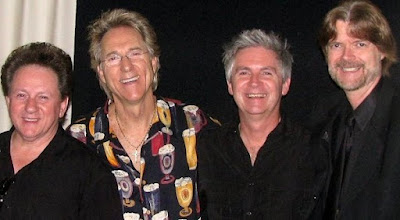Jon Lord co-wrote many
Deep Purple hits including Smoke On The Water
Jon Lord, the former keyboard player with
heavy rock band Deep Purple, has died aged 71.
Lord co-founded Deep Purple in 1968 and
co-wrote many of the group's songs including Smoke On The Water. He also played
with bands including Whitesnake.
He had been receiving treatment for pancreatic
cancer since last August.
He died at the London Clinic on Monday,
surrounded by family, a statement said. "Jon passes from Darkness to
Light," it added.
Lord was influenced by classical, blues and
jazz but played his Hammond organ with a rock attitude and helped Deep Purple
become pioneers of progressive and heavy rock.
Tributes have been paid by musicians including
one-time Deep Purple bandmate Joe Satriani, Iron Maiden and Anthrax.
Ex-Rage Against the Machine star Tom Morello
wrote on Twitter: "RIP the great Jon Lord, Deep Purple's
cornerstone/keyboardist. So many great great songs and that incredible SOUND of
his! Thankyou."
Former Yes keyboard player Rick Wakeman was a
friend and said he was "a great fan".Lord's Concerto for Group and Orchestra was performed at the Royal
Albert Hall in 1969
"We were going to write and record an
album before he become ill," he said. "His contribution to music and
to classic rock was immeasurable and I will miss him terribly."
Born in Leicester, Lord learned classical
piano at an early age before being seduced by watching early rock 'n' roll star
Jerry Lee Lewis and jazz organist Jimmy Smith.
He could have chosen a career as an actor
after receiving a drama school scholarship, but started playing in pub bands
including short-lived outfits with future Rolling Stones star Ronnie Wood and
his brother Art.
He also worked as a session musician and is
thought to have played piano on The Kinks' hit You Really Got Me.
After meeting guitarist Ritchie Blackmore
through another project, the first incarnation of Deep Purple was born.
Lord's classical influence surfaced when Lord
composed Concerto for Group and Orchestra, which the band performed with the
Royal Philharmonic Orchestra at the Royal Albert Hall in 1969.
But the group refined their heavy rock sound
and found mass success at the start of the 1970s with albums including Deep
Purple in Rock and Machine Head.
In their classic years, the band also included
Blackmore, singer Ian Gillan, drummer Ian Paice and bassist Roger Glover.
Lord continued to compose classical works
alongside the group's output and, when they split in 1976, he joined other
groups Whitesnake and Paice, Ashton and Lord.
Deep Purple reformed in 1984 and resumed at
the height of their commercial prowess, playing to tens of thousands of fans
around the world.
They sold a total of 150 million albums and
Lord remained an ever-present amid numerous line-up changes until he left in
2002.
Still composing, he had signed to a classical
music label and performed a concert to mark the 30th anniversary of Concerto
for Group and Orchestra.
"Thirty years later the piece came back
and changed my life again... It gave me the courage to step outside and carve a
career for myself outside the band," he told an interviewer.
He broke the news of his cancer diagnosis on
his website last year, telling fans he would continue to write music as part of
his therapy.










